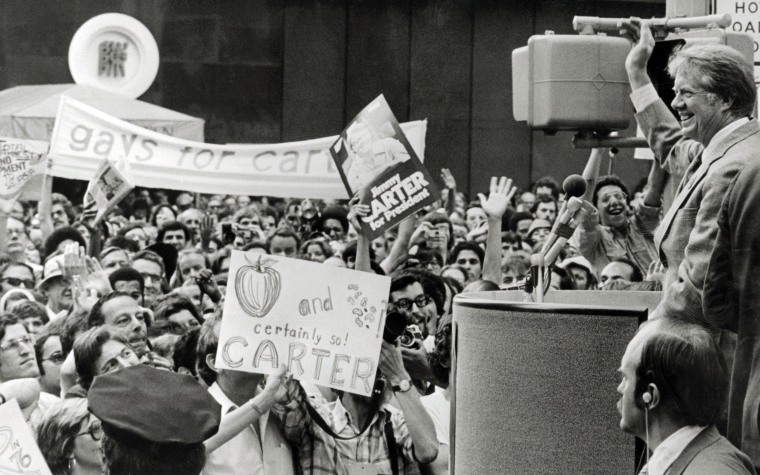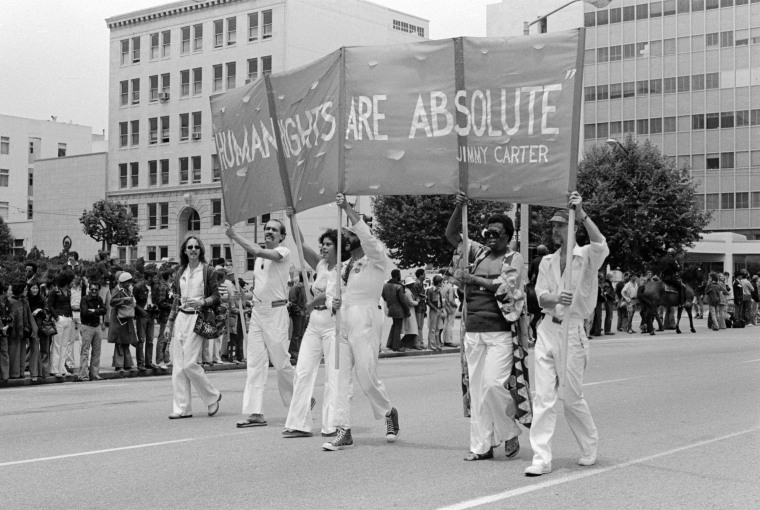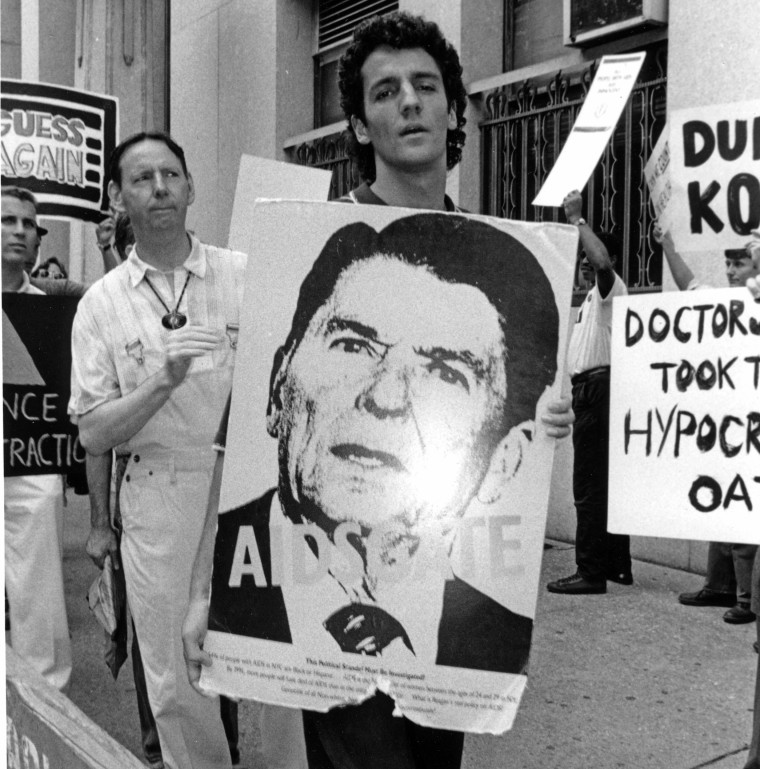When Jimmy Carter was president from 1977 to 1981, gays and lesbians were unable to obtain government security clearance, same-sex intimacy was illegal in at least two dozen states, and gay marriage was no more than a radical pipe dream. Moreover, political support for LGBTQ causes was still largely taboo for politicians on both sides of the aisle.
But Carter, a Southern Democrat and devout Baptist, stood out for his early support for pro-gay legislation and his embrace of LGBTQ advocates.
“If we’re looking at the federal or White House response to LGBTQ issues, the first time we see it is under Carter, which I think in the mid-’70s is incredibly brave,” said Michael Bronski, a professor of women, gender and sexuality studies at Harvard University and the author of “A Queer History of the United States for Young People. “It would have been just as easy for him not to say anything.”
In 1976, when Carter, a former Georgia governor, was running for president, he voiced his support for legislation that is controversial even among some of today’s politicians. The measure, known as the Equality Act, sought to amend the 1964 Civil Rights Act to ban discrimination on the basis of sexual orientation. (An updated version of the bill, which included a ban on gender-identity discrimination, passed the House in 2021 but stalled in the Senate.)
 A "Gays for Carter" sign at the 1976 Democratic National Convention in New York City.AFP via Getty Images
A "Gays for Carter" sign at the 1976 Democratic National Convention in New York City.AFP via Getty ImagesAsked about the Equality Act at a news conference in May 1976, Carter said, “I will certainly sign it, because I don’t think it’s right to single out homosexuals for special abuse or special harassment,” according to the National Archives.
Several days after his public comments, Carter’s team reiterated his stance on the controversial issue in a statement, citing his previous comments on passing anti-discrimination laws.
“As President, I can assure you that all policies of the federal government would reflect this commitment,” he told Philadelphia Gay News in March 1976, according to a copy of the release on the National Archives website.
Later that year, civil rights pioneer Harvey Milk endorsed Carter in a column in the Bay Area Reporter, calling him a “man who believes that the government has no business in a person’s bedroom.” Milk went on to become one of the country’s first openly gay elected officials when he won a seat on the San Francisco Board of Supervisors in 1977; he was assassinated the following year.
Perhaps most significantly, historians say, was when a group of roughly two dozen activists from the National Gay Task Force met with presidential adviser Margaret “Midge” Costanza to discuss discrimination protections at the White House in 1977.
 Marchers in San Francisco's Gay Freedom Day parade carry a banner with a quote from Jimmy Carter on June 26, 1977.Roger Ressmeyer / Corbis/VCG via Getty Images file
Marchers in San Francisco's Gay Freedom Day parade carry a banner with a quote from Jimmy Carter on June 26, 1977.Roger Ressmeyer / Corbis/VCG via Getty Images fileJames Kirchick, author of “Secret City: The Hidden History of Gay Washington,” noted that the gathering not only marked the first White House meeting with gay activists but also came shortly after the U.S. Civil Service Commission lifted its ban on gay people working in the federal government in 1975.
“Up until that point, gay people can be prevented from and purged from government jobs in large numbers,” he said. “So to have just within two years a meeting with gay rights organizers and leaders was pretty significant and a way to put the imprimatur of the presidency on this issue and to signal to the country that gay people were citizens and deserved recognition as citizens.”
Kirchick cautioned that the meeting did not produce tangible results and that it took place while Carter was away at the presidential country residence at Camp David, Maryland. He believes, according to his research, that while the administration allowed the meeting to occur, it would have been too controversial for Carter to attend it.
“They did not want a photo-op with the president and these leaders,” Kirchick said, referring to the Carter administration. “It was scheduled deliberately while he was out of town.”
Nonetheless, the meeting was unprecedented and symbolic, creating fanfare among some of the most prominent anti-LGBTQ voices of the ’70s.
“Behind the high-sounding appeal against discrimination in jobs and housing, which is not a problem to the ‘closet’ homosexual, they are really asking to be blessed in their abnormal life style by the office of the President of the United States,” Anita Bryant, a singer and former Miss Oklahoma known for her Florida orange juice commercials-turned-anti-LGBTQ activist, said in a statement to The New York Times at the time. “What these people really want, hidden behind obscure legal phrases, is the legal right to propose to our children that there is an acceptable alternate way of life — that being a homosexual or lesbian is not really wrong or illegal.”
Bronski said figures like Bryant, who launched the infamous “Save Our Children” campaign in 1977, and the broader rise of the religious right in the ’70s made what would be a routine White House meeting by today’s standards all the more significant.
“What we see with Carter is that he’s really sympathetic to it,” Bronski said of gay rights, “and he’s setting up a sort of different national paradigm that counters these groups.”
In 1978, Carter again aligned himself with the gay community, urging California voters to defeat Proposition 6, also known as the Briggs Initiative, a controversial, headline-grabbing measure that sought to bar gay and lesbian people from teaching in public schools.
“As long as I am in the White House, our nation will always be identified as the nation that will insist and fight for basic human rights,” Carter said at a November 1978 “Get Out the Vote” rally in Sacramento, California, according to a transcript of the speech published by the University of California, Santa Barbara. “I also want to ask everybody to vote against Proposition 6.”
The measure was defeated 58.4% to 41.6%, according to the GLBT Historical Society.
Bronski and other historians say that while Carter’s efforts to move the needle on gay rights may seem “small” by today’s standards, he planted the seeds for future presidents.
“He may not have done as much as we wanted him to or he may not have done it as much as he could have or he may have been playing it safe in some ways,” Bronski said. “But he is literally the first person to begin to articulate policies around this issue, breaking barriers for other Democratic presidents to do this.”
Carter’s defeat
Historians stressed that what Carter did for gay rights during his presidency cannot be remembered without acknowledging what came directly afterward — and what may have been, had Carter been able to continue moving the needle, albeit slowly, for gays and lesbians.
 An AIDS activist during a 1988 protest outside the New York City Health Department. Thomas McGovern / Getty Images file
An AIDS activist during a 1988 protest outside the New York City Health Department. Thomas McGovern / Getty Images fileIn 1980, Carter lost his presidential re-election campaign to “Moral Majority” ally Ronald Reagan, a Republican, roughly one year before the first official government report on AIDS was released. To this day, activists blame the Reagan administration for not taking the growing medical crisis seriously.
Asked about whether Reagan was tracking the spread of AIDS in 1982, his press secretary, Larry Speakes, infamously laughed. Reagan first publicly mentioned AIDS only in 1985. By that time, an estimated 12,500 people had already died of the disease, according to global nonprofit group amfAR, the Foundation for AIDS Research.
“If Carter had won and was president when the AIDS crisis started, we would have seen a completely different federal response to the AIDS crisis and probably would have saved hundreds of thousands of lives,” Bronski said.
‘Jesus never said a word about homosexuality’
Long after he left the White House, Carter continued to vocally support gay people.
In 2012, roughly two months before President Barack Obama and Vice President Joe Biden, Carter became one of the most prominent Americans to voice his support for same-sex marriage. And Carter — who taught Sunday school since he was 18 — used an atypical reason to justify his support: Christianity.
“Homosexuality was well-known in the ancient world, well before Christ was born, and Jesus never said a word about homosexuality,” Carter said in an interview with HuffPost at the time. “In all of his teachings about multiple things — he never said that gay people should be condemned. I personally think it is very fine for gay people to be married in civil ceremonies.”
In his death, historians say, Carter may not be the first figure whom LGBTQ Americans recall when they think of equality. However, they say, his legacy on LGBTQ rights was more consequential and courageous than he has often been given credit for.
.png)
 1 week ago
11
1 week ago
11


































 Bengali (BD) ·
Bengali (BD) ·  English (US) ·
English (US) ·